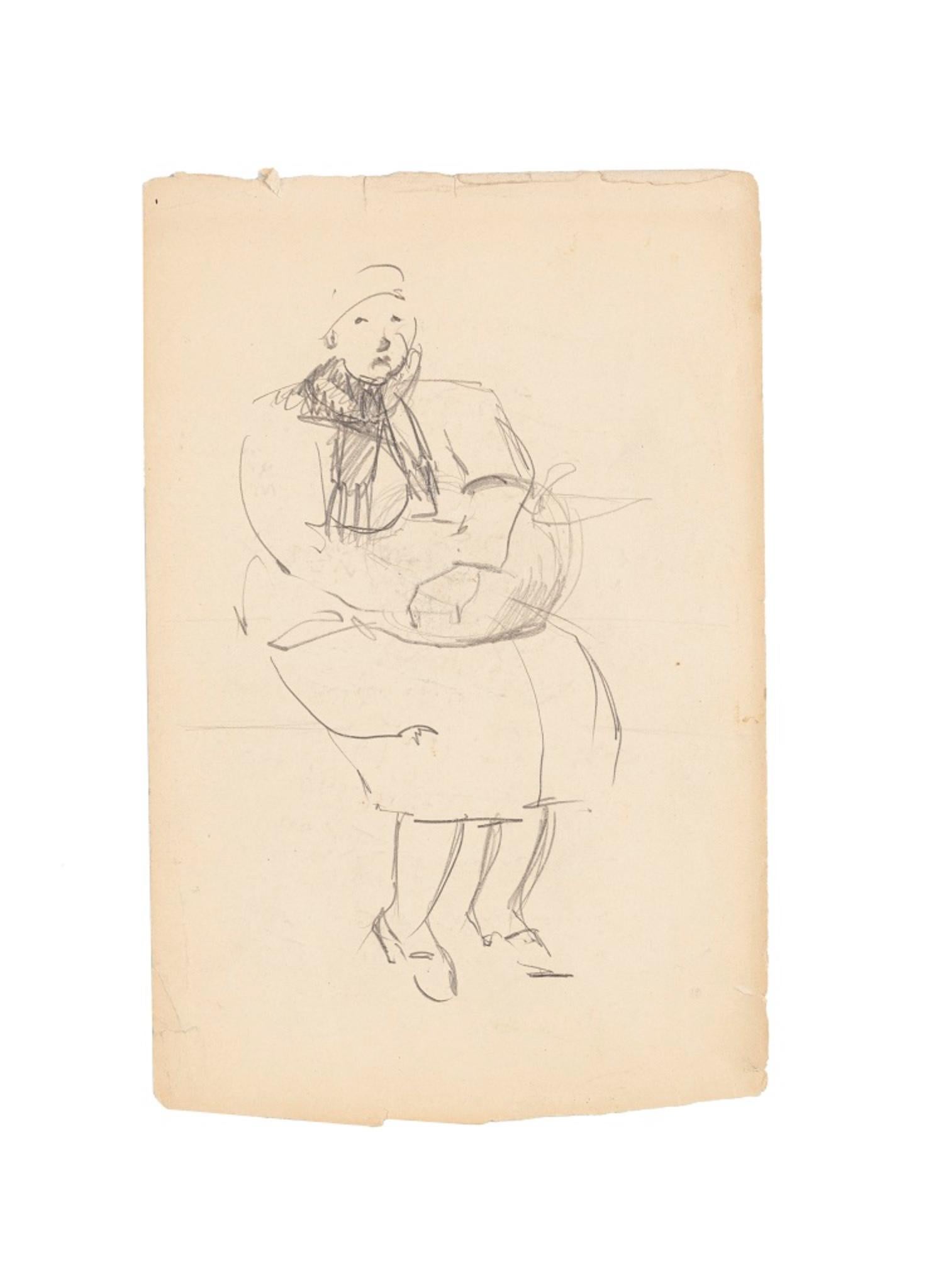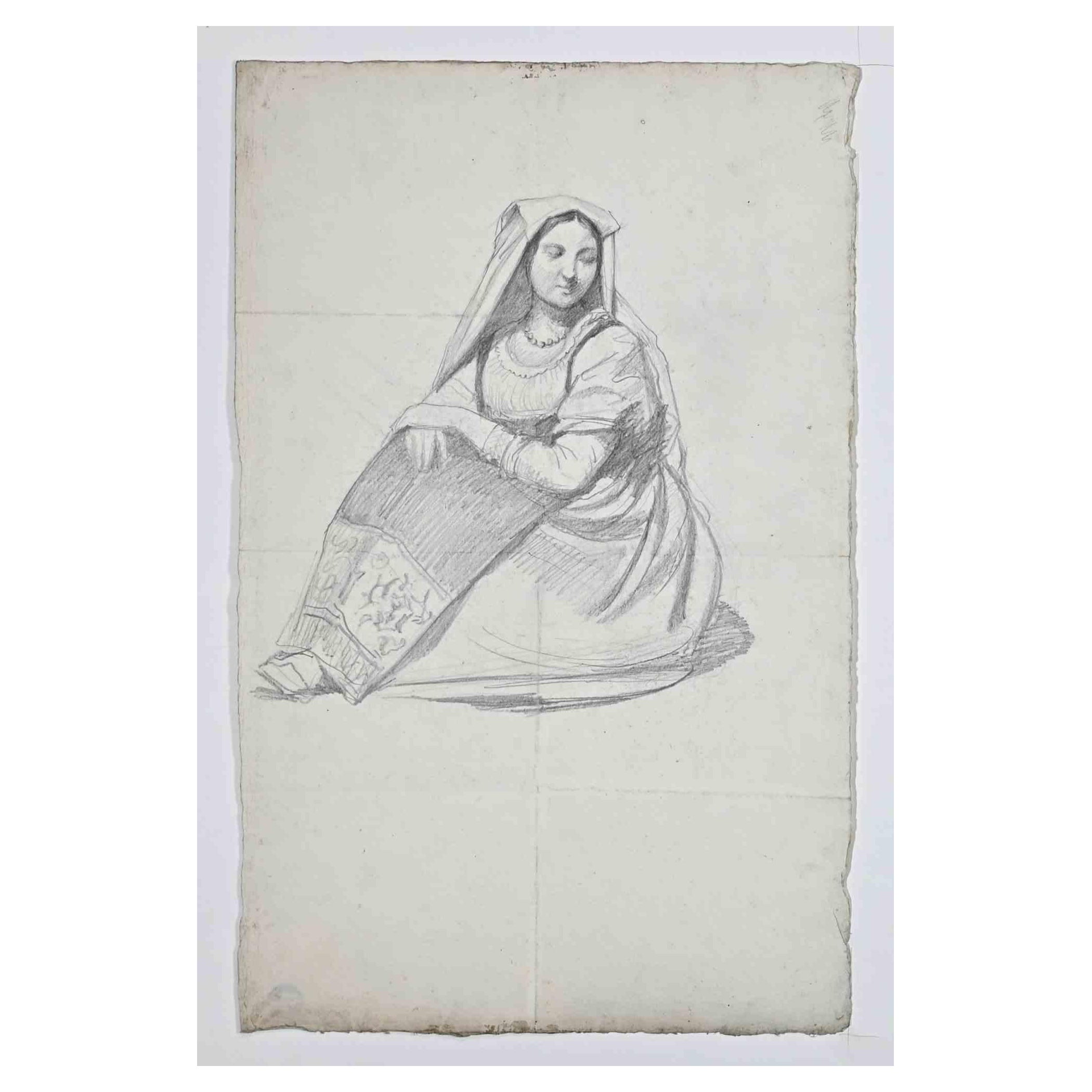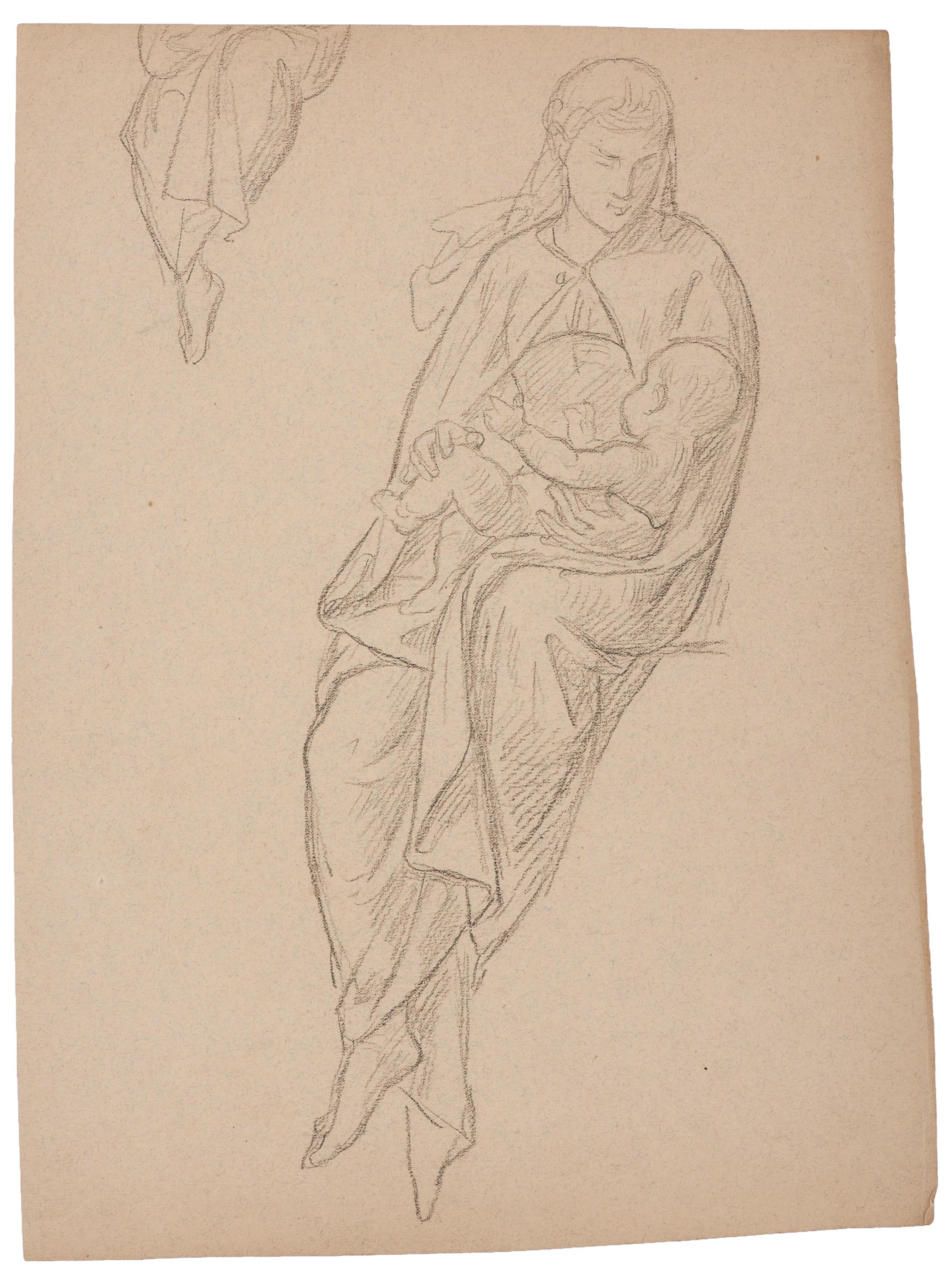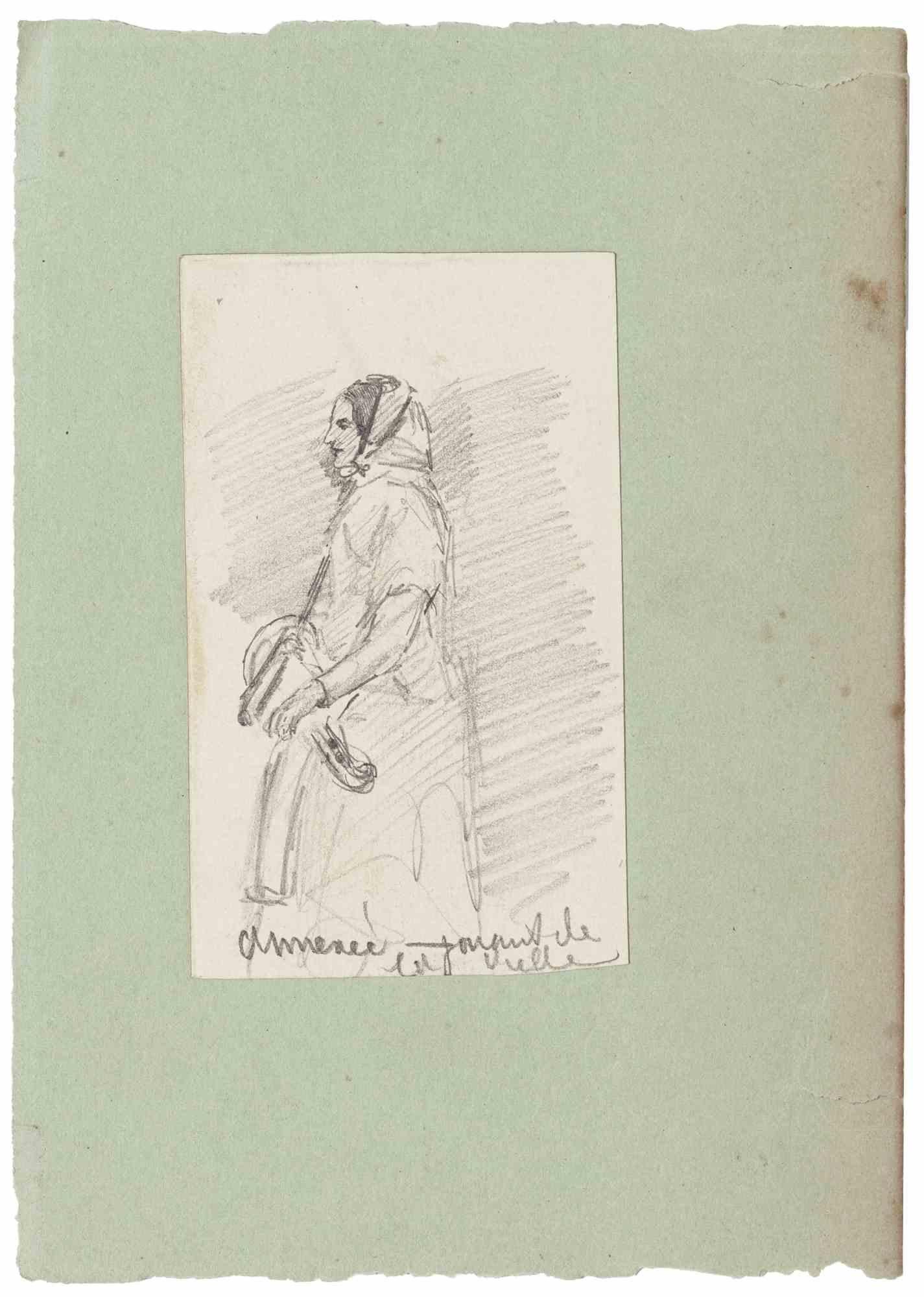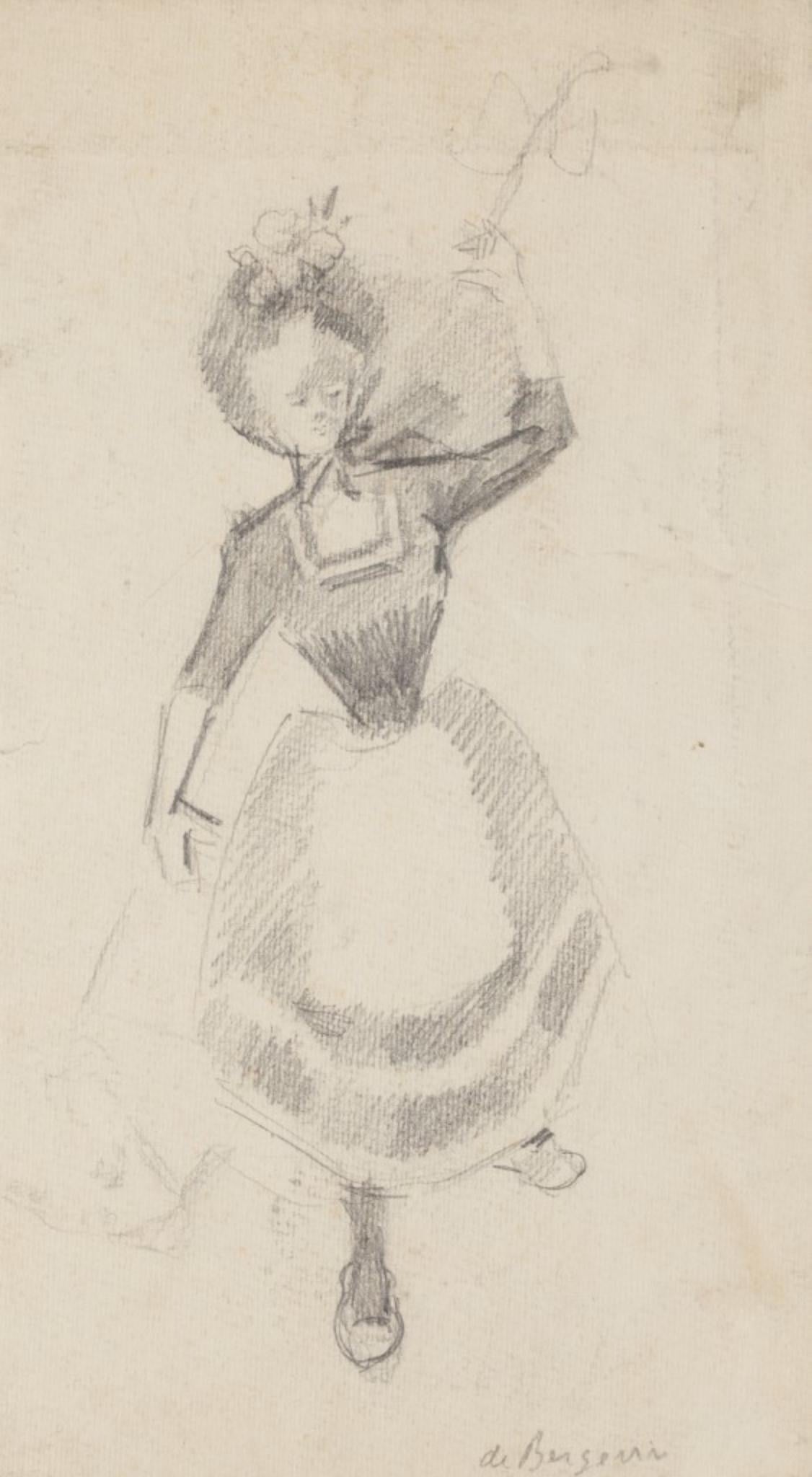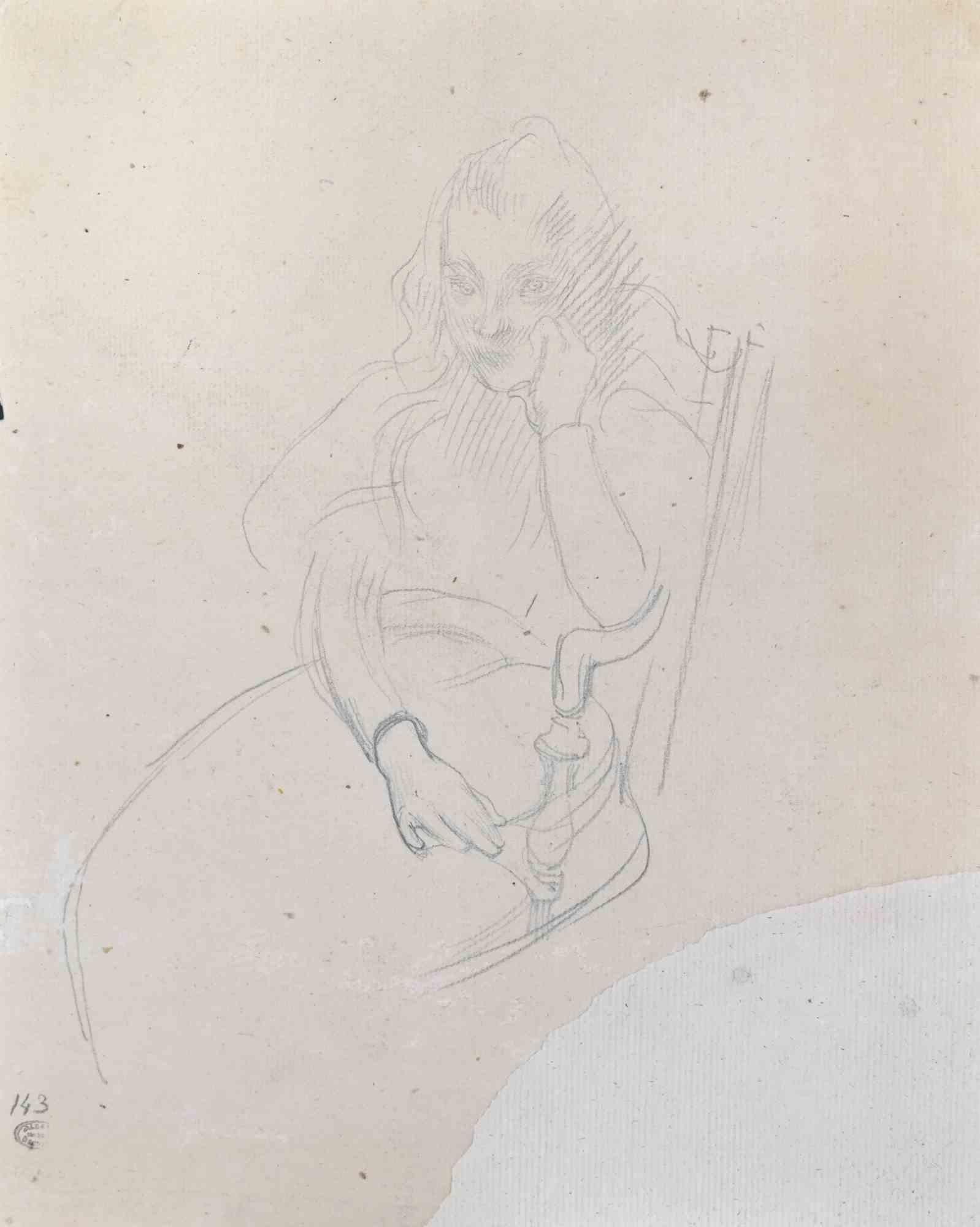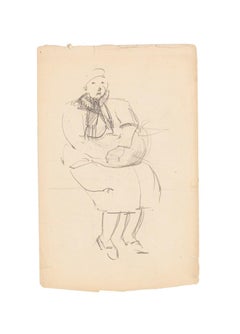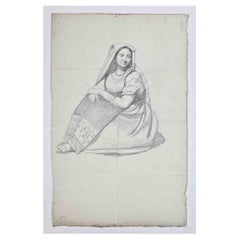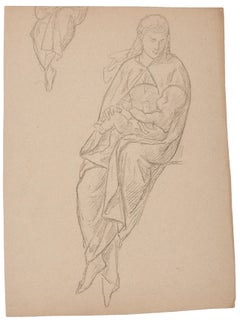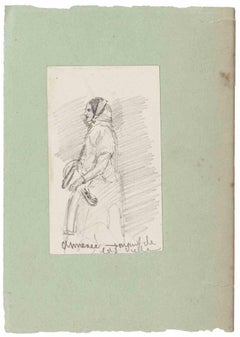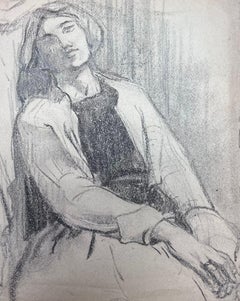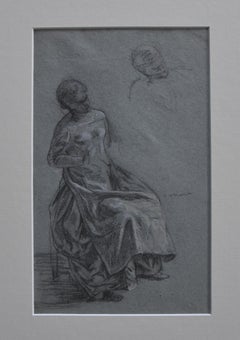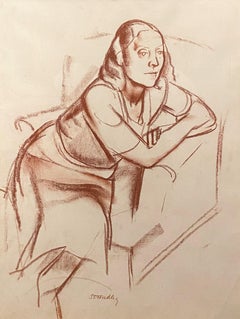Items Similar to Tired Woman - Original Pencil Drawing - Early 20th Century
Want more images or videos?
Request additional images or videos from the seller
1 of 2
UnknownTired Woman - Original Pencil Drawing - Early 20th CenturyEarly 20th Century
Early 20th Century
$334.42
£247.80
€280
CA$462.61
A$509.83
CHF 266.91
MX$6,262.36
NOK 3,353.84
SEK 3,138.93
DKK 2,132.41
About the Item
Tired Woman is an original drawing in pencil on paper realized by an Anonymous artist.
With the monogram of the artist's on the lower right.
The state of preservation of the artwork is very good.
The artwork represents a seated woman, created with delicate and soft strokes, skilfully expressed, well-defined hatching. The artist's efforts indicate the perfect applying of aesthetic features.
- Creation Year:Early 20th Century
- Dimensions:Height: 8.86 in (22.5 cm)Width: 8.27 in (21 cm)Depth: 0.04 in (1 mm)
- Medium:
- Movement & Style:
- Period:
- Framing:Framing Options Available
- Condition:Insurance may be requested by customers as additional service, contact us for more information.
- Gallery Location:Roma, IT
- Reference Number:Seller: M- 1070741stDibs: LU65037449732
About the Seller
4.9
Platinum Seller
Premium sellers with a 4.7+ rating and 24-hour response times
1stDibs seller since 2017
7,693 sales on 1stDibs
Typical response time: 3 hours
- ShippingRetrieving quote...Shipping from: Roma, Italy
- Return Policy
Authenticity Guarantee
In the unlikely event there’s an issue with an item’s authenticity, contact us within 1 year for a full refund. DetailsMoney-Back Guarantee
If your item is not as described, is damaged in transit, or does not arrive, contact us within 7 days for a full refund. Details24-Hour Cancellation
You have a 24-hour grace period in which to reconsider your purchase, with no questions asked.Vetted Professional Sellers
Our world-class sellers must adhere to strict standards for service and quality, maintaining the integrity of our listings.Price-Match Guarantee
If you find that a seller listed the same item for a lower price elsewhere, we’ll match it.Trusted Global Delivery
Our best-in-class carrier network provides specialized shipping options worldwide, including custom delivery.More From This Seller
View AllAn Old Woman - Original Pencil Drawing - Early 20th Century
Located in Roma, IT
An old Woman is an original modern artwork realized in the first half of the 20 Century.
Original drawing realized in pencil on paper.
Quite good conditions: along the margins f t...
Category
Early 20th Century Modern Figurative Drawings and Watercolors
Materials
Pencil
Woman - Original Pencil Drawing by Raymond Balze - Mid 19th century
Located in Roma, IT
Woman is an Original Pencil Drawing realized by Raymond Balze (1818-1909).
Good Condition on a yellowed paper included a white cardboard passpartout (67x51 cm).
No signature.
Raym...
Category
Mid-19th Century Modern Figurative Drawings and Watercolors
Materials
Pencil
Woman with a Child - Original Drawing in Pencil - Early 20th Century
Located in Roma, IT
Woman with a child is a beautiful artwork realized by an artist of the 20th century.
Pencil drawing on brown paper. In very good condition except for a fold on the lower right corne...
Category
Early 20th Century Figurative Drawings and Watercolors
Materials
Paper, Pencil
Portrait of Woman - Original Drawing - 19th Century
Located in Roma, IT
Portrait of Woman is an original drawing in Pencil on paper realized by an anonymous artist in the 19th Century.
Good Conditions.
The artwork is depicted through free strokes in a ...
Category
19th Century Modern Figurative Drawings and Watercolors
Materials
Pencil
Figure of Woman - Original Pencil Drawing - 20th Century
Located in Roma, IT
"Figure of Woman" is an original drawing in tempera on paper, realized by an Anonymous Artist of the XX Century .
The state of preservation of the artwork is very good.
Sheet dimen...
Category
20th Century Modern Portrait Drawings and Watercolors
Materials
Pencil
The Girl - Pencil Drawing - Late 19th century.
Located in Roma, IT
The Girl is a drawing on ivory-colored paper, realized by an Anonymous artist in the late 19th century.
Pencil Drawing.
In good condition, aged margins.
The artwork is represented...
Category
Late 19th Century Modern Figurative Drawings and Watercolors
Materials
Pencil
You May Also Like
French Impressionist Laid Back Lady Portrait Pencil Sketch Painting
Located in Cirencester, Gloucestershire
Female Portrait
by Louise Alix (French, 1888-1980) *see notes below
provenance stamp to the back
black pastel drawing on artist paper, unframed
measures: 10 high by 8 inches wide
co...
Category
Mid-20th Century Impressionist Figurative Paintings
Materials
Pastel
Thoughtful Woman by Benjamin II Vautier - Graphite on paper - 21x16 cm
By Benjamin II Vautier
Located in Geneva, CH
Benjamin II Vautier (1895–1974) was a Swiss-born artist, known for his contributions to both painting and graphic art. He was born into a family with artistic roots, as the son of Ot...
Category
Mid-20th Century Modern Portrait Drawings and Watercolors
Materials
Paper, Graphite
Attributed to Eugene Deully (1866-1933) A sitting woman, study, drawing
Located in Paris, FR
Attributed to Eugene Deully (1866-1933)
A sitting woman, study,
Pencil and heightenings of white gouache on blue grey paper;
23 x 14.5 cm
Framed (damag...
Category
1890s French School Figurative Drawings and Watercolors
Materials
Pencil
Woman at Rest, Signed Charcoal Sketch, 20th Century British
By James Stroudley
Located in London, GB
Charcoal on paper, signed lower left
Image size: 15 3/4 x 21 inches (40 x 53.5 cm)
Contemporary frame
James Stroudley
Stroudley was born in London on 17 June 1906, the son of James Stroudley, showcard and ticket writer. He studied at Clapham School of Art (1923-27) and then at the Royal College of Art (1927-30), where his teachers included Alan Gwynne-Jones and William Rothenstein. As a recipient of the first Abbey Scholarship he was able to spend three years in Italy from 1930, where he absorbed the influences of Giotto and Piero della Francesca, and produced one of the last wholly satisfying decorative cycles by a Rome Scholar of the period. From 1934, he exhibited at the Royal Society of British Artists, and was elected to its membership in the following year.
From the Second World War – in which he worked with the Camouflage Unit – Stroudley taught at St Martin’s School of Art and was a visiting lecturer at the Royal Academy Schools. Though he continued to live in London, his later work, exhibited at the Royal Academy from 1955, indicated regular painting trips to Kent and Sussex coasts. However, much of his later work was abstract. In 1971, his former student, Peter Coker, paid homage to Stroudley by including his work in the exhibition ‘Pupil & Masters’, held at Westgate House, Long Melford, Suffolk.
Stroudley married three times, and his wives included the fashion artist to the Sun newspaper...
Category
Mid-20th Century Modern Figurative Drawings and Watercolors
Materials
Paper, Charcoal
Housewife by Rodolphe Piguet - Drawing 21x24 cm
Located in Geneva, CH
Work on paper
Category
19th Century Modern Figurative Drawings and Watercolors
Materials
Drypoint
$320 Sale Price
20% Off
Drawing of a captive woman
By Henry Fuseli
Located in London, GB
Collections:
Sir Thomas Lawrence, who acquired the contents of Fuseli’s studio;
Susan, Countess of Guilford, née Coutts (1771-1837), acquired from the Lawrence estate;
Susan, Baroness North (1797-1884), daughter of the above;
Mrs A. M. Jaffé, acquired in France, c. 1950 to 2016.
Black chalks, on buff-coloured paper
Stamped verso: ‘Baroness Norths Collection / of Drawings by H Fuseli Esq.’
Framed dimensions: 26.38 x 20.63 inches
This boldly drawn sheet depicting a seated figure was made by Fuseli at an important and highly productive moment in his career. The monumental drawing is closely related to another sheet by Fuseli in the British Museum which Schiff published as subject unknown. Both drawings were made when Fuseli was designing his most important sequence of historical works, including scenes from Shakespeare and Milton, The Nightmare and The Death of Dido which was exhibited at the Royal Academy to great critical acclaim in 1781. The present drawing does not relate directly to any of Fuseli’s finished historical paintings of the period, but evidently the image of a slightly menacing, seated and covered old woman was precisely the sort of motif he was playing with. It is notable that the same figure reappears later in Fuseli’s work as the witch from Ben Jonson’s Witch’s Song which Fuseli produced as both a painting and engraving in 1812.
Fuseli returned to London in 1779 from a highly creative and productive period in Rome and established himself as one of the leading history painters of the period. Fuseli re-established contact with his old mentor Sir Joshua Reynolds, becoming a regular guest at his dinner table and visitor to his studio. The earliest and most striking manifestation of this strategy was Fuseli's Death of Dido, exhibited in 1781 at the Royal Academy. Executed on the same scale as Reynolds's version (Royal Collection), Fuseli's vertically oriented picture was hung directly opposite Reynolds's with its horizontal orientation, inevitably inviting comparison between the two works and garnering Fuseli much publicity and favourable reviews in the newspapers.
The present, previously unpublished sheet, relates closely to a drawing now in the British Museum. That sheet shows the same seated old woman, drawn on a smaller scale and more schematic in design, seated next to an anatomical drawing of a man. The pose of this figure is related to the pose of Dido in his Death of Dido; the foreshortened torso, arrangement of head, oblique view of Dido’s features and arms all suggest that the study can be viewed as an initial thought for the composition. Fuseli may have initially thought of including the figure of the hunched and covered old woman. Drawn on identical paper to the British Museum sheet, our study is an enlarged depiction of the same figure, more elaborately delineated and developed. The presence of a chain to the right of the figure, suggests that the iconography was related in some way to a scene of imprisonment.
Fuseli had first explored the motif of the hooded old woman in an early Roman drawing, 'The Venus Seller'. The idea of a grotesque old woman, hooded and with angular nose and projecting chin seen in profile was most spectacularly used by Fuseli in his sequence of paintings depicting The Three Witches from Macbeth. Fuseli seems to have kept the present sheet and may have returned to it when preparing a painting of The Witch and the Mandrake from Ben Jonson’s Witch’s Song from his Masque of Queens in 1812. Here the same seated figure looks out from under her hood and picks a mandrake by moonlight. Jonson’s drama had been performed at the court of James I in 1609, inspired the subject. To throw the nobility of the queens into relief, the poet added a coven of witches, one of whom declares: ‘I last night lay all alone, On the ground, to hear the mandrake groan; And plucked him up, though he grew full low, And, as I had done, the cock did crow.’ The figure was reversed in the associated etching which was published in 1812. It seems likely that the present drawing remained as part of Fuseli’s working archive of figure studies.
The present drawing was presumably purchased with the bulk of Fuseli’s drawings after the artist’s death by Sir Thomas Lawrence. Lawrence’s large group of Fuseli drawings were then acquired by Susan, Countess of Guildford (1771-1837). Lady Guildford was the eldest daughter of the banker Thomas Coutts (1735-1822), who himself had supported Fuseli’s journey to Rome in the 1770s and had remained one of the artist’s key...
Category
18th Century Old Masters Figurative Drawings and Watercolors
Materials
Chalk
More Ways To Browse
Female Form
Etchings France
Painting 1966
Framed Architectural Prints
Don Artist
Vintage Medal
Impressionist City
Painting Signed Robert
Gold Framed Landscape Painting
36 X 36 In Painting
Fluid Art
Unknown Antique Painting
Famous Photographs
Still Life Painting With Flowers
Original Large Drawing
Used Oil Pastels
Framed Sketch Art
Muted Art
